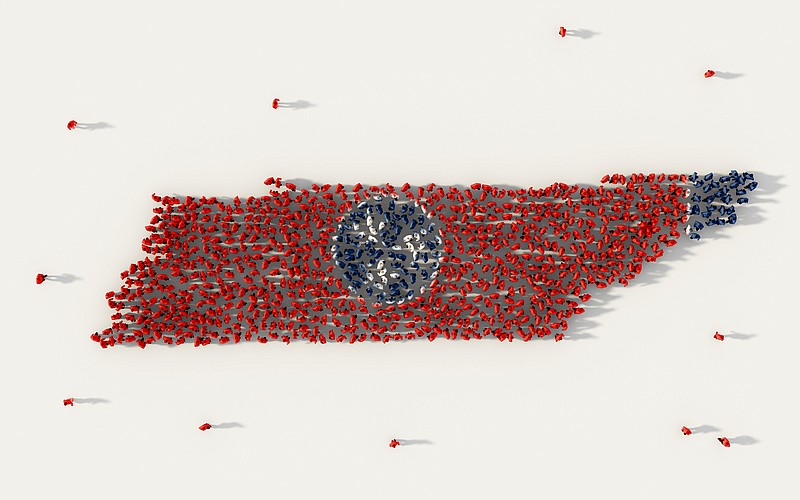We don't begrudge the state of Tennessee spending money to promote tourism. We don't object to using one of Nashville's biggest country stars to help out with the effort. And we don't even worry about Gov. Bill Lee yucking it up with Brad Paisley to promote the state.
But practically everything else about the "Tennessee on Me" campaign, in which the state is providing up to 10,000 tourists with $250 airline vouchers if visitors book at least two nights in a hotel in one of the state's four largest cities, seems wrongheaded.
After all, this is Tennessee. People want to come here.
Earlier this year, TripAdvisor announced Gatlinburg was the number-one trending travel destination in the United States on its U.S. Trending Destinations list. Another list by U-Haul earlier this year said more people moved to Tennessee in 2020 than any other state. A third list this year said the Great Smoky Mountains National Park was the most visited national park in 2020.
And a 2019 study found the state the second friendliest (behind Minnesota) in the country.
But now we have to pay people to come here?
The state of Tennessee was more fortunate than most in coming through the worst of the global coronavirus pandemic with a sound economy and a robust tax collection. But even with federal government's monetary assistance, the state's hotels, restaurants and tourist attractions didn't fare as well.
So a 2021 national or regional radio, television and multimedia campaign promoting the state, its major cities, its beauty and its attractions wasn't out of line or needlessly wasteful.
Previous state tourism campaigns have featured B.B. King or have livestreamed concerts from Nashville to other cities, and such campaigns have had themes such as "Tennessee Roads," "We're Playing Your Song," "Tennessee - The Soundtrack of America," and even "The Stage Is Set for You" simulating footage of Dolly Parton and Elvis Presley riding together in a convertible.
But $250 vouchers, with the social media campaign in its major cities promoted by commercials featuring Lee telling Paisley his words about "Tennessee on Me" really mean "Tennessee On Me," meaning the governor?
Ugh.
The spot comes across as arrogant and tone deaf, as if Lee were saying the $250 vouchers were coming out of his largess rather than from taxpayer funds.
Such sentiment would fit New York's Andrew Cuomo or California's Gavin Newsom, but Tennessee's governor in our experience has been more humble than boastful. We hope the governor rethinks this strategy - quickly.
Worse, though, is what the pay-fors look like. Sure, we understand you often have to spend money to make money where tourism is concerned.
But for state government to recoup the cost of a single airline voucher through its 7% sales tax on goods, the person holding the voucher would have to spend about $3,570 on taxable items while visiting Tennessee.
So we hope a Bluesman Fleetwood vintage guitar from Spring Hill is on their list, or about 15 bottles of Jack Daniel's Sinatra Select Whiskey in Lynchburg or a whole lot of boxes of Moon Pies or Little Debbies from Chattanooga.
The campaign brought out Lee's usual Democratic critics, who - in a misunderstanding of how government works - compared the voucher program purchased with state funds to the governor's canceling of additional federal unemployment funds to get Tennesseans back to work. But it also rankled Republican legislative leaders in Lee's party.
Senate Finance Chairman Bo Watson, R-Hixson, said "it's not the strategy I would have used," and Senate Speaker Randy McNally, R-Oak Ridge, said he wants tourism officials to "provide more detail to the legislature about such initiatives during the budget process in the future."
McNally, who is also the lieutenant governor, also pointedly noted how the state's tourism industry has already "bounced back in record time" and how two of the cities - not mentioning Nashville and Memphis by name - "exacerbated the economic crisis by instituting overly aggressive lockdown policies."
The campaign to promote travel only to the four cities also came in for criticism from several corners. Indeed, tourism in the smaller hamlets of Tennessee likely suffered much more than it did in its largest cities.
The $2.8 million campaign spent $120,000 to develop the social media spot, $200,000 on a social media buy and $2.5 million for the vouchers. Paying tourist attractions for them to offer discount tickets and giving $10 or $25 gift cards to visitors for use at restaurants or hotels might have gone a lot further and cost the state less in the long run.
This idea, in our estimation, was not the state's finest hour.
